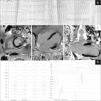A 67-year-old man with a history of systemic arterial hypertension and a chest stab trauma with emergent cardiothoracic surgery 38 years previously was admitted to our cardiology department for sustained monomorphic ventricular tachycardia.
At admission to the emergency department the patient complained of palpitations, sweating and general malaise. He was hemodynamically stable. The admission electrocardiogram showed regular wide complex tachycardia with right bundle branch block pattern consistent with ventricular tachycardia (Figure 1A). Chemical cardioversion with amiodarone was successfully performed. The baseline ECG demonstrated sinus rhythm with Q waves in DI, aVL and V3–V6. Laboratory tests, including troponin, were unremarkable. The transthoracic echocardiogram revealed normal global left ventricular systolic function with anterolateral hypokinesia. Coronary angiography excluded epicardial coronary disease. Cardiac magnetic resonance imaging revealed transmural gadolinium enhancement in the mid-apical anterior and lateral segments consistent with the chest stab wound (Figure 1B). The patient was referred for electrophysiological study, during which ventricular tachycardia was induced with the same pattern as the admission ECG (Figure 1C) but it was not possible to perform ablation because of a probable epicardial circuit and an implantable cardioverter-defibrillator was implanted. The patient is currently asymptomatic.
A) Admission ECG demonstrating a monomorphic ventricular tachycardia; B) CMR images in short axis, long axis and four-chambers views obtained after gadolinium injection demonstrating transmural gadolinium enhancement in mid-apical anterior and lateral segments; C) morphology of ventricular tachycardia during the electrophysiological study and left ventricular endocardial mapping.
Ventricular tachycardia is a life-threatening arrhythmia. In the majority of cases it is associated with structural heart disease, particularly coronary disease. We describe an unusual case of a 67-year-old man who survived a chest stab wound and presented 38 years later with ventricular tachycardia due to the anterolateral transmural scar.
Ethical disclosuresProtection of human and animal subjectsThe authors declare that no experiments were performed on humans or animals for this study.
Confidentiality of dataThe authors declare that no patient data appear in this article.
Right to privacy and informed consentThe authors declare that no patient data appear in this article.
Conflicts of interestThe authors have no conflicts of interest to declare.








